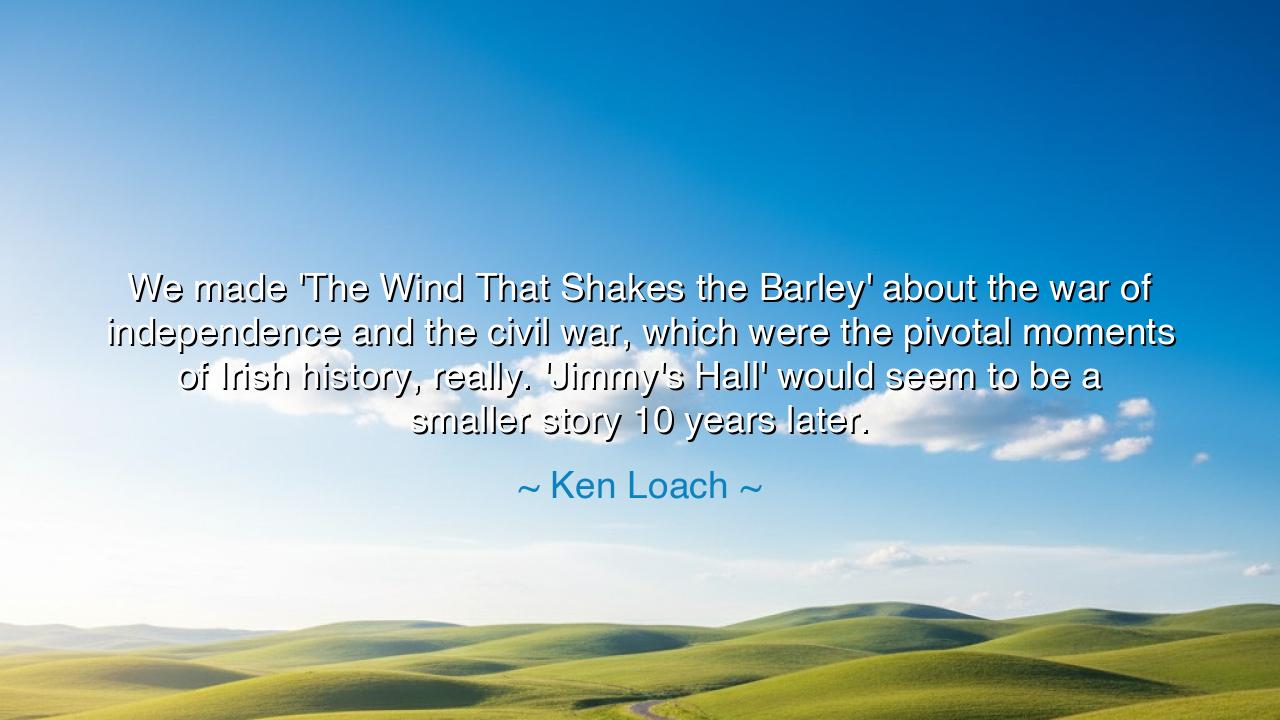
We made 'The Wind That Shakes the Barley' about the war of
We made 'The Wind That Shakes the Barley' about the war of independence and the civil war, which were the pivotal moments of Irish history, really. 'Jimmy's Hall' would seem to be a smaller story 10 years later.






In the quiet voice of an artist who has spent his life giving voice to the forgotten, Ken Loach once reflected: “We made The Wind That Shakes the Barley about the war of independence and the civil war, which were the pivotal moments of Irish history, really. Jimmy’s Hall would seem to be a smaller story 10 years later.” These words, though modest, carry the weight of centuries. They speak not merely of films, but of the deep rhythm of history—the great convulsions that shape nations, and the quieter struggles that shape the soul. Loach, a chronicler of the working class and the wounded spirit, reminds us that history is not only forged in the roar of revolution, but also in the gentle persistence of those who live in its aftermath.
To understand his words, one must first understand the origin of these two stories. The Wind That Shakes the Barley, released in 2006, is Loach’s searing portrayal of the Irish War of Independence and the Civil War that followed—a time when brother turned against brother, when the dream of freedom was stained by division. It is a film of fire and sorrow, a lament for idealism betrayed and unity broken. Ten years later, Loach returned to Ireland’s story with Jimmy’s Hall, set in the 1930s, long after the guns had fallen silent. On the surface, it is indeed a “smaller story”—the tale of Jimmy Gralton, a man who built a community hall to teach, to dance, and to dream. Yet, beneath this quiet rebellion beats the same unyielding spirit: the fight for dignity, the defiance of oppression, the belief that ordinary people can claim joy as their own.
In this contrast—between war and peace, between grandeur and simplicity—lies Loach’s profound insight. He speaks as one who knows that the epic and the intimate are two sides of the same truth. History may remember the battles, the treaties, and the revolutions, but it is in the years after, in the small acts of courage and creation, that the true measure of a nation’s heart is revealed. The war of independence may have won Ireland its flag, but it was the work of men like Jimmy Gralton that sought to win its freedom of the soul—the freedom to think, to gather, to celebrate life unshackled by fear.
The ancients understood this rhythm well. After the great wars of their own time, philosophers and poets emerged to ask: What is freedom for? When Athens triumphed over Persia, it was Pericles who built the Parthenon and Socrates who taught the young to question. When Rome conquered its rivals, it was not the soldiers but the artists and thinkers who shaped the empire’s legacy. So too with Loach’s vision: The Wind That Shakes the Barley is the thunder of revolution; Jimmy’s Hall is the rain that nourishes the earth after the storm. One shows us how freedom is won; the other, how it must be lived.
Loach’s reflection carries also a warning—that when the battle is over, injustice does not vanish; it merely changes form. Jimmy Gralton’s hall was condemned not by foreign soldiers, but by his own community, stirred by fear and authority. Thus, Loach shows that the enemies of liberty are not only those who invade from without, but those who silence from within—those who fear education, laughter, and the gathering of free minds. The revolutions of guns and flags may end, but the revolution of conscience must continue. And that revolution, as Loach teaches, is fought not with weapons, but with compassion, solidarity, and truth.
In his humble phrasing—“a smaller story 10 years later”—there is also a lesson in humility and depth. For what appears small in the eyes of history may be vast in the eyes of humanity. A classroom, a workers’ meeting, a dance hall—all these are battlegrounds of meaning. Just as a single seed carries the promise of a forest, so too does a single act of defiance hold the power to rekindle the spirit of a nation. Loach, ever the humanist, saw in Jimmy’s hall the continuation of the Irish struggle—not through blood, but through beauty; not through hatred, but through hope.
So, my listener, take this as your teaching: the making of history never ends. The great wars of our ancestors are over, but their echoes live in our daily choices. Each of us builds our own “hall” when we create a space for truth, for justice, for joy. The heroism of the battlefield is fleeting; the heroism of compassion endures. Learn, therefore, to honor both the storm and the stillness—to remember the grand revolutions, but also the quiet acts that sustain freedom long after the banners have been folded. For as Loach reminds us, it is in the “smaller stories” that the soul of humanity is kept alive.






AAdministratorAdministrator
Welcome, honored guests. Please leave a comment, we will respond soon